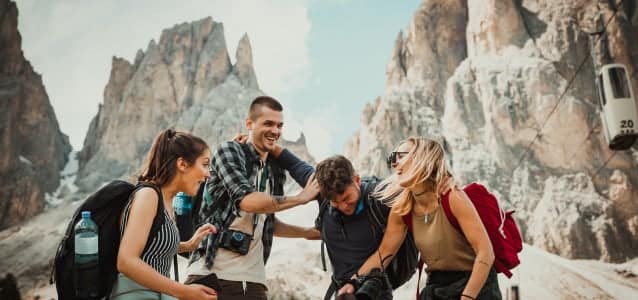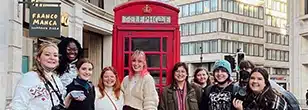Job Placement Program
Job Placement Program Details
Let applicants know that as the J-1 Visa sponsor, InterExchange will verify the conditions of the participant’s work and will fully vet each initial or new host employer before the person may start working in the U.S.
All positions for our Work & Travel USA participants are to be seasonal and temporary and should provide regular communication and interaction with U.S. citizens and allow participants to experience U.S. culture.
2012 Federal Register requires sponsors to confirm that the positions/host employers:
- Will not displace U.S. workers at the worksites.
- Have not experienced layoffs in the past 120 days.
- Do not have workers on lockout or strike.
An example of an acceptable Self-Placement Job Offer is provided in the Appendix.
In addition, InterExchange reserves the right to reject any job offer if the position jeopardizes the student’s well-being or safety or does not provide the required exposure to the culture and customs of the U.S.
What to Expect
Students in the Job Placement program are guaranteed one job offer through InterExchange. InterExchange Work & Travel USA Regional Managers email applications to our network of employers for their review. During this time, students are ‘on hold’ with a particular employer whose needs match the students’ requests as closely as possible. If the employer accepts the student, that person is ‘placed.’ Students should have a realistic understanding of what types of job placements InterExchange can provide.
The most important principle for students to keep in mind is flexibility. Students must be open-minded, as they might not get their ideal placement. Employers’ particular preferences and students’ work dates, English levels, and requests to be placed with a friend can all be limiting factors in the placement process.
InterExchange takes great care to make sure that all placements offer students a fair wage in relation to the cost of living in the area and the opportunity to have a fulfilling season in the U.S.
A sample job offer is provided in the Appendix.
What students should expect from InterExchange Work & Travel USA job placements:
- Entry level and seasonal positions. These are basic positions that do not require previous experience or professional training.
- Hard work! Most jobs require physical labor, which can be tiring and can become boring. Cleaning is a common job.
- The types of jobs that are also held by young people in the U.S. during their school breaks.
What students should not expect from InterExchange Work & Travel USA job placements:
- A job related to their studies or future career plans.
- A job with no physical work.
- To work as waitstaff, front desk, or ski instructor.
Types of Jobs Available
Students must be open to placements in at least three of the following different types of jobs:
- Housekeeping: May include doing laundry, vacuuming, cleaning bathrooms, changing sheets, making beds, and cleaning public areas of the resort.
- Kitchen help: Will include dishwashing! These positions often include cutting food, cleaning floors and kitchen equipment, assisting the chef, and taking out garbage.
- Maintenance: May include repair work, shoveling snow, lifting and moving furniture, cleaning pools, taking out garbage, and cleaning public areas of the resort.
- Sales Help: May include selling food or merchandise (T-shirts, fast food, gifts, etc.), working with money, assisting customers, cleaning and stocking shelves. InterExchange has few of these positions available, and they require excellent English skills.
- Amusement Park (summer only): May include cleaning public areas and bathrooms, selling fast food, and operating games or rides. Many of these jobs require working outside in the heat.
InterExchange does not guarantee that students will be placed according to their requests for types of jobs.
Since many employers feel that they need to know more about students before assigning them to a specific position, many wait until their employees have arrived to determine job assignments.
Prohibited Jobs
InterExchange must vet all initial, replacement, and additional jobs based on U.S. Department of State regulations and guidance to verify that participants will pursue the purpose of the J-1 Visa program. The following positions are not allowed on the InterExchange Work & Travel USA program:
- In positions that could bring notoriety or disrepute to the Exchange Visitor Program;
- In sales positions that require participants to purchase inventory that they must sell in order to support themselves;
- In domestic help positions in private homes (e.g., child care, elder care, gardener, chauffeur);
- As pedicab or rolling chair drivers or operators;
- As operators or drivers of vehicles or vessels for which drivers’ licenses are required regardless of whether they carry passengers or not;
- In positions related to clinical care that involve patient contact;
- In any position in the adult entertainment industry (including, but not limited to jobs with escort services, adult book/video stores, and strip clubs);
- In positions requiring work hours that fall predominantly between 10:00 p.m. and 6:00 a.m.;
- In positions declared hazardous to youth by the Secretary of Labor at Subpart E of 29 CFR part 570;
- In positions that require sustained physical contact with other people and/or adherence to the Centers for Disease Control and Prevention’s Universal Blood and Body Fluid Precautions guidelines (e.g., body piercing, tattooing (including henna), massage, manicure, hair braiding);
- In positions at businesses that offer body piercing, tattooing (including henna), massage, manicure, hair braiding;
- In positions that are substantially commission-based and thus do not guarantee that participants will be paid minimum wage in accordance with federal and state standards;
- In positions involved in gaming and gambling that include direct participation in wagering and/or betting;
- In positions in chemical pest control, warehousing, catalogue/online order distribution centers;
- In positions with traveling fairs or itinerant concessionaires;
- In positions for which there is another specific J visa category (e.g., camp counselor, intern, trainee) ;
- In positions in the North American Industry Classification System’s (NAICS) Goods-Producing Industries occupational categories industry sectors 11, 21, 23, 31-33 numbers as outlined by the Bureau of Labor Statistics, including, but not limited to: construction (includes specialty trade contractors), mining (includes oil and gas extraction, support activities for mining), manufacturing (food manufacturing, textile mills, apparel manufacturing, wood product manufacturing, printing), natural resources (crop production, animal production, fishing, support activities for agriculture and forestry);
- Positions through employment or staffing agencies;
- Positions in kiosks or cart stands at malls;
- Positions in home-based businesses;
- Positions in warehouses or factories;
- Administrative positions handling sensitive/personal information;
- Positions as an independent contractor (1099 Form employee);
- Positions in fisheries;
- Positions in door-to-door sales or canvassing;
- Positions in industrial style/scale service sector (jobs that involve assembly lines, repetitive movement using heavy machinery, use of industrial size steamers/pressers and dryers, use of industrial chemicals, factory-like atmosphere);
- Positions at single-guard pools;
- Positions that involve the use of deli slicers;
- Positions that are not compensated hourly e.g. piece wages, stipends, etc.;
- Positions as an independent contractor/hired on a 1099 form;
- With employers who hire J-1 students for three seasons (spring, summer, winter)
- Positions in which the host employer has received cash or gift incentives to accept program participants
Acceptable Jobs
- The position offered must be seasonal. Employment is of a seasonal nature when the position is tied to a certain time of the year by an event or pattern and requires labor levels above and beyond existing worker levels.
- The position offered must provide opportunities to work alongside and interact regularly with U.S. citizens. Participants must be able to experience U.S. culture during both the workday portion of their Summer Work Travel program as well as outside of work.
- The position offered must not displace domestic U.S. workers
- The position offered must provide pay and benefits commensurate with those offered to their similarly situated U.S. counterparts and pay eligible participants for overtime worked in accordance with applicable State or Federal law.
- The location must contain suitable, affordable housing (e.g., that meets local codes and ordinances) and reliable, affordable, and convenient transportation to and from work














